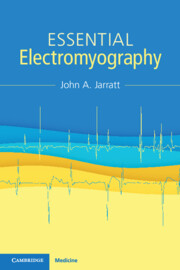Book contents
- Essential Electromyography
- Essential Electromyography
- Copyright page
- Dedication
- Contents
- Figures
- Diagrams
- Tables
- Preface
- Acknowledgements
- Abbreviations
- Chapter 1 Introduction
- Chapter 2 Basic Anatomy and a Little Physiology
- Chapter 3 Peripheral Nerve Types
- Chapter 4 Peripheral Nerve Function
- Chapter 5 The Neuromuscular Junction
- Chapter 6 Muscle
- Chapter 7 Some Technical Matters: Electrodes, Stimulators, Amplifiers, Display, Averagers
- Chapter 8 Volume Conduction
- Chapter 9 Pathology
- Chapter 10 Electromyography (EMG)
- Chapter 11 Nerve Conduction Studies (NCS): Introduction
- Chapter 12 Nerve Conduction Studies: Normal
- Chapter 13 Nerve Conduction Studies: Degeneration
- Chapter 14 Nerve Conduction Studies: Demyelination
- Chapter 15 Degree of Pathology
- Chapter 16 Tests of Neuromuscular Transmission
- Chapter 17 Other Techniques: F-waves and H-reflexes
- Chapter 18 Clinical Applications
- Chapter 19 Other Stuff: Aberrant Nerve Pathways, A-waves, EMG Anomalies
- Chapter 20 Normal Values
- Chapter 21 Conclusion
- Glossary
- Further Reading
- Index
Chapter 13 - Nerve Conduction Studies: Degeneration
Published online by Cambridge University Press: 14 September 2023
- Essential Electromyography
- Essential Electromyography
- Copyright page
- Dedication
- Contents
- Figures
- Diagrams
- Tables
- Preface
- Acknowledgements
- Abbreviations
- Chapter 1 Introduction
- Chapter 2 Basic Anatomy and a Little Physiology
- Chapter 3 Peripheral Nerve Types
- Chapter 4 Peripheral Nerve Function
- Chapter 5 The Neuromuscular Junction
- Chapter 6 Muscle
- Chapter 7 Some Technical Matters: Electrodes, Stimulators, Amplifiers, Display, Averagers
- Chapter 8 Volume Conduction
- Chapter 9 Pathology
- Chapter 10 Electromyography (EMG)
- Chapter 11 Nerve Conduction Studies (NCS): Introduction
- Chapter 12 Nerve Conduction Studies: Normal
- Chapter 13 Nerve Conduction Studies: Degeneration
- Chapter 14 Nerve Conduction Studies: Demyelination
- Chapter 15 Degree of Pathology
- Chapter 16 Tests of Neuromuscular Transmission
- Chapter 17 Other Techniques: F-waves and H-reflexes
- Chapter 18 Clinical Applications
- Chapter 19 Other Stuff: Aberrant Nerve Pathways, A-waves, EMG Anomalies
- Chapter 20 Normal Values
- Chapter 21 Conclusion
- Glossary
- Further Reading
- Index
Summary
Nerve conduction velocity in degenerative disease depends on which nerve fibres are affected. If the largest diameter ones are spared, velocity will be normal. Otherwise, there will be a decrease of up to 30 per cent. The localising value of nerve conduction studies in degenerative disease is limited though hardly required after focal trauma. Electromyography will usually also be needed. An abnormal finding will always be found if either the stimulating or recording electrode lies over a region of degeneration. Preganglionic pathology occurring in radiculopathies is associated with normal sensory conduction. The degree to which sensory nerve action potentials (SNAPs) are reduced in amplitude is a useful guide to the severity of the pathology within postganglionic fibres. These concepts are illustrated with simple but helpful diagrams.
Keywords
- Type
- Chapter
- Information
- Essential Electromyography , pp. 55 - 59Publisher: Cambridge University PressPrint publication year: 2023

